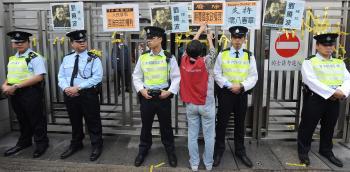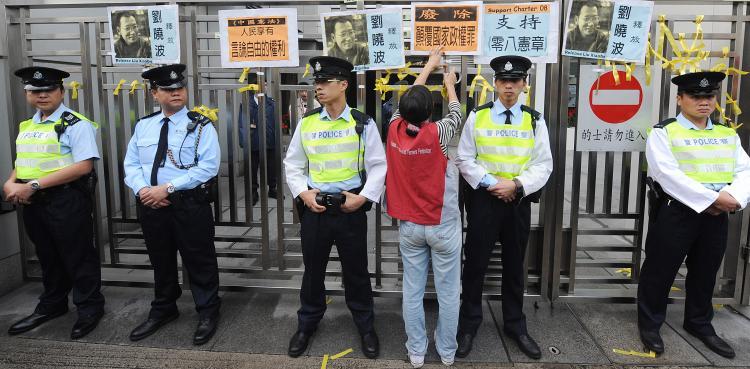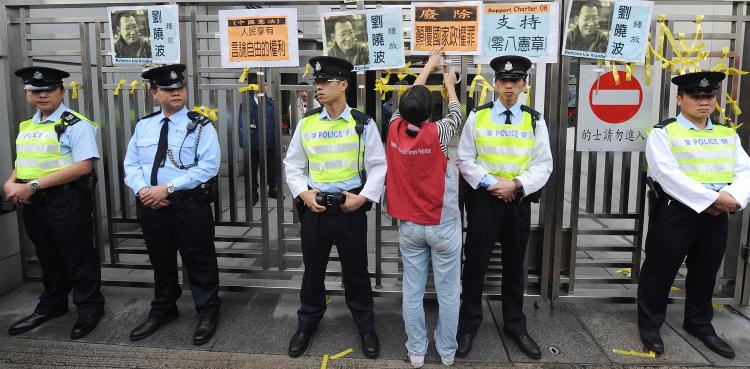China remains an authoritarian one-party system, and proposals for a multiparty system and separation of the branches of government—legislative, executive, and judicial—are summarily dismissed by communist leader Hu Jintao as well as Wu Bangguo, who is number two in the Party’s hierarchy.
The CECC annual report noted the Party tightening its grip on all administrative levels and a trend of “increasing social monitoring and control measures continued, as the Party created additional organizations to maintain social stability.
For Falun Gong practitioners in China, the year saw a marked increase in the length of sentences—up to 18 years—as the communist regime alters its approach to suppressing the meditation group. In the past decade, practitioners have routinely been sent to “re-education through labor” (RTL) camps of up to three years, in which no formal charges or trial is necessary, and no appeal is allowed under the China’s system for RTL detentions. Relatively few were charged, tried, and sentenced to prison camps.
This year the regime is “sentencing” many more practitioners to imprisonment. Although the trials are a sham, they give the regime the veneer of legality, says the Falun Dafa Information Center (FDIC), which released on Dec. 22 a list of 863 Falun Gong practitioners who had been sentenced within the last year and half.
Once incarcerated in either a RTL or prison camp, practitioners are subject to frequent torture and hard labor in hazardous conditions to forcibly “transform” them and induce them to renounce their faith, according to FDIC.
Rights Attorney Sentenced for Seven Years
The 2009 CECC annual report noted a statement by a group of rights defense (weiquan) lawyers in May, just a few days before the June 4 twentieth anniversary of the Tiananmen Square Massacre. The statement said that besides the regime’s repression of petitioner citizens, intellectuals, and religious figures, the regime intensified in 2009 “its full-scale repression of rights defense lawyers to an unprecedented degree.” The statement continued, “The process of building a country ruled by law has suffered a serious setback.”
The reason that the defense lawyers were complaining is because the regime stepped up its use of “abductions, physical violence, and threats of physical violence to harass and intimidate human rights lawyers,” said the CECC report. The attacks intensified this year, especially just prior to the June 4 anniversary date.
One example among several cited by the CECC is lawyer Wang Yonghang, who defended Falun Gong practitioners and wrote several open letters that challenged the legality of their persecution. Wang’s case is instructive of how much the legal system has deteriorated in China from the perspective of defense attorneys.
Wang had argued that Article 300, which is most often used to prosecute Falun Gong, is not logical. How can simply practicing a religion or belonging to a religious group obstruct justice or “undermine the implementation of the law,” as Article 300 states? It also lacks international standards of clarity and specificity, he said.
On July 4 police invaded Wang’s home, searched it, and took Wang and his wife into custody. The attorneys that were to defend him were not allowed to visit him. “While being held incommunicado detention, Wang was severely beaten, causing fractures in his right ankle. He was not given proper medical treatment and his ankle was only operated on one month later, in August, after it had become infected,” said the Falun Dafa Information Center. On Nov. 27, he was sentenced to seven years imprisonment for violating—you guessed it—Article 300.
A method used by the regime much more often in 2009 against human rights attorneys was the denial of licenses to practice. What is normally a routine affair—the annual assessment and registration system—has been adopted this year with special intensity to suspend or revoke the licenses of at least 21 rights attorneys, many of whom are prominent attorneys who had taken on “sensitive” cases such as May 2008 Sichuan earthquake, tainted milk products, Tibetans, HIV carriers, house churches, political dissidents, Falun Gong, expropriation of rural land, forced evictions, and unnatural deaths in police custody, according to the CECC, which drew mainly from the accounts of China Human Rights Defenders (CHRD).
The Yitong law firm in Beijing was notified in February to shut its doors for six months as an administrative punishment for allegedly allowing an unlicensed lawyer to practice law. The firm adamantly denied the charge. Even if charges were true, a lawyer for Yitong said the punishment of closure was far too severe and that a warning or fine would be more appropriate. Closure amounted to a threat to its continued existence. The real reason for the shutdown was apparently because Yitong called for direct elections of officers of the state-controlled Beijing Lawyers Association, and took on “sensitive” cases.
Intellectual Liu Xiaobo Sentenced 11 Years
Liu Xiaobo, 54, is a leading Chinese intellectual who spent 20 months in prison after the Tiananmen Massacre, and was in a labor camp for three years in the 1990s. He is known for his eloquence in support of democracy. Liu tried to disassociate the concept of the Chinese Communist Party from China in a statement reported by The Epoch Times, Oct. 4, 2005.
Liu said that the Chinese Communist Party (CCP) has “emphasized a specious logic of governance—the theory of ‘death of the party is death of the nation.’ … In fact, the ‘death of the party’ and the ‘death of the nation’ have no inevitable causality. This is because any political party is a representative of a special interest group and does not have the grounds to assert that it represents the ‘nation, ethnic groups, and people.’ Even if it is the ruling party, it does not equal the nation, and even less the ethnic groups or culture. The [CCP] regime does not equal China, and even less the Chinese culture.”
For his writings like the above quote and advocating democracy, Liu was found guilty in a Beijing court, of “inciting subversion to state power,” a charge frequently used against dissidents. In a closed trial that lasted less than three hours and denied access to Liu’s wife and foreign media, Liu was sentenced on Dec. 25 to 11 years imprisonment.
“Like much of China’s judicial process, especially cases deemed politically sensitive, what happened inside the courtroom remains largely out of public view,” said a Human Rights in China press release.
Longer Sentences and Subject to Torture
The seven-year sentence of lawyer Wang and 11-year sentence of dissident Liu are harbingers of a harsher judicial climate in China this year. In the case of the 863 Falun Gong practitioners sentenced, 63 received sentences of 10 years or more.
A large proportion of the Falun Gong incarcerated had previously been detained in RTL or prison camps for practicing Falun Gong, sometimes twice, said FDIC. “Most had been tortured in custody—including being beaten, deprived of sleep, and shocked with electric batons,” said FDIC. The longer sentences target those found by the authorities to have resumed practicing even after release from previous—and almost always shorter—periods in detention, according to FDIC.
Black Jails
If China’s judicial system is looking worse, one can try another legal avenue—petitioning. In China, citizens can request higher authorities to intervene in matters, which typically range from business disputes to illegal land grabs, corruption to accusations of police torture. This year, the Party’s Central Political-Legal Committee issued an opinion, which discouraged petitioners from traveling to Beijing and threatened to dismiss their cases and turn them back when they come to Beijing repeatedly.
In spite of the fact that citizen-petitioning is enshrined in China law, officials at all levels—county, municipal, and provincial—have a vested interest in preventing petitioners from reaching the petition office in Beijing. They are subject to financial and career advancement penalties when large numbers of petitioners from their areas are found in Beijing, and normally don’t want their abuses exposed by the petitioners.
Consequently, local officials have developed an extrajudicial system to intercept, abduct, and detain petitioners in black jails or black houses. The officials pay off the keepers of the black jails, where “detainees are denied access to legal counsel and in most cases contact with family and friends, according to a Nov. 12 report by Human Rights Watch (HRW). Detainees are kept under constant surveillance, and subject to often arbitrary physical and psychological abuse including beatings, sexual violence, threats, and intimidation,” says the HRW report.
A small percentage of petitioners are sent to psychiatric hospitals by force and even medicated. This practice is also applied to devout religious followers and Falun Gong practitioners, according to a Radio Free Asia report cited by CECC.






